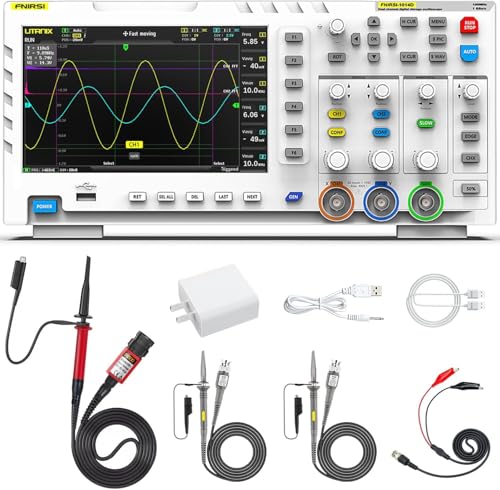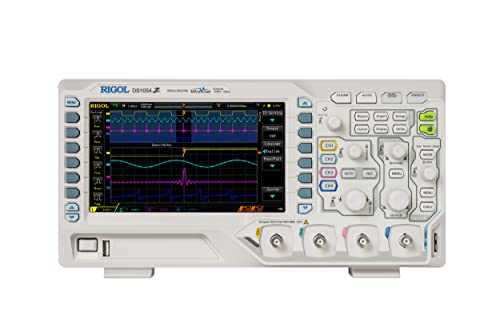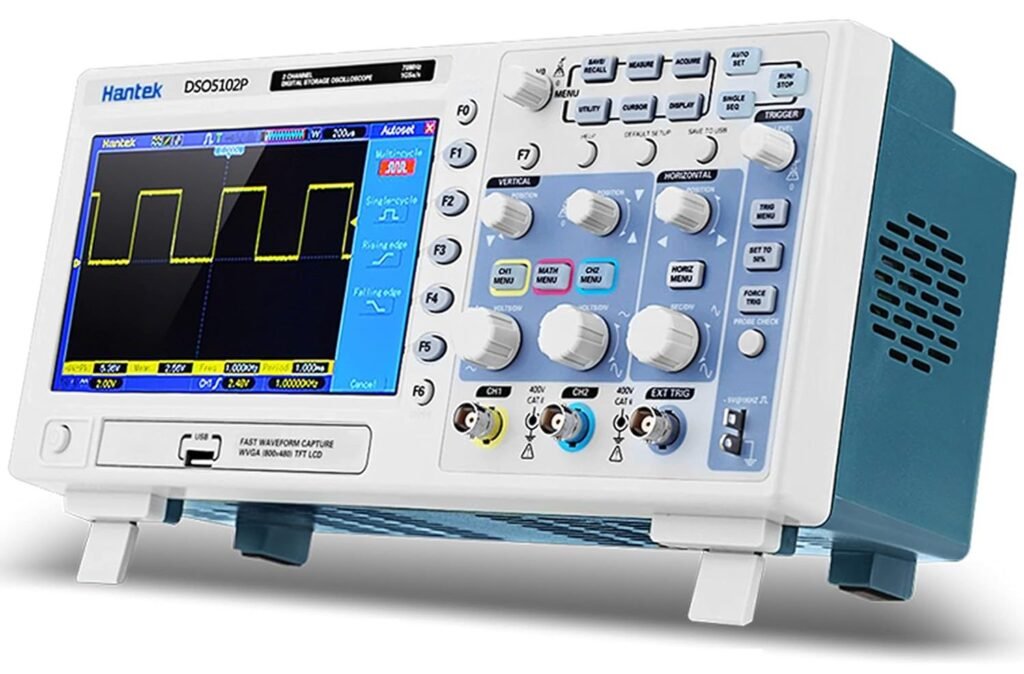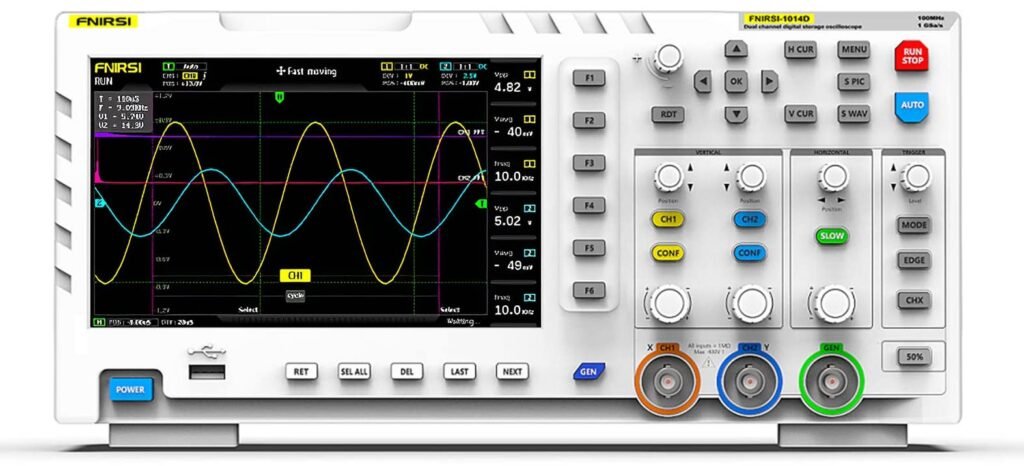Best Oscilloscopes in 2025








Don’t forget to also peruse our oscilloscopes, spectrum analyzers, and other electronics lab tools.
Hantek DSO5102P 2-Channel
USB Digital Storage Oscilloscope (100Mhz)


The Hantek DSO5102P Oscilloscope is our top pick and one of the best entry-level oscilloscopes as it has a reasonable price and all the features one would expect for a dual-channel oscilloscope at this price point. Features include:
- Bandwidth of a 100MHZ
- 7-inch display at 800×480
- 1 G samples per second
- 4 mathematical functions
- Memory Depth of 40K
Pros
- Nice graphical visualizations.
- Simple setup and straightforward
- Good build quality.
- Best for hobbyist, great value!
Cons
- The ON/OFF button is a little cheap feeling.
- 10 second start-up time.
- A little slow at times.
- Some experience issues with the frequency generator.
This is our top pick when it comes to value for money. Even extensive Amazon reviews overwhelmingly agree that this is a bargain price with exceptional performance. All in all, this is our first pick for a bench oscilloscope that’s perfect for hobbyists or small electronics shops.
Rigol DS1054Z 4-Channel
Digital Oscilloscope (50 MHz)


This is an established brand in the scientific and tooling space and they make great oscilloscopes. Their consistency in quality and price gets the Editors Choice pick. You get the comfort and peace of mind that comes with purchasing a product backed by the service and warranty of an established brand. Features:
- 50 MHz Bandwith
- 50 MHz Bandwith
- 4 Channels
- USB connector
- LAN(LXI) for connection to an ethernet cable
- Free Included Software
- 12Mpts standard memory
Pros
- Best value for 4 channels.
- Large bright LCD.
- Excellent build quality.
- Best 4 channels for technicians on a budget.
Cons
- The user interface may take time to figure out.
- The built-in fan can be noisy and get annoying.
- The included probes may not be of the highest quality.
This is a higher-priced option on the list but may be the best option for experienced semi-pro users. It is Amazon’s Choice because it has had excellent user reviews for several years. Full review of the Rigol DS1054Z here.
FNIRSI 1014D Oscilloscope
2-channel (100MHz)


This digital scope is less than $200. Otherwise known as a steal. Sure, not the highest ranked, not the highest-performing digital scope, and not the prettiest. But I assure you, this piece of equipment will get most of your electronic probing tasks done. Think of it this way. How many times a year do you push the limits of your oscilloscope anyway? Features include:
- Bandwidth of a 100MHZ
- Function signal generator built-in
- 1 G samples per second
- Auto features for newbies
- Record length up to 270K depth
Pros
- Best value 200MHz option.
- Precision 7 inch LCD display.
- Auto setup feature, saves time.
- One-button screen captures to USB stick.
Cons
- The user interface may overwhelm the newbie.
- Advanced triggering features may get tricky.
- Setup can be overwhelming for beginners.
- Probes may not be best for pro users.
After personally using the FNIRSI 1014D Oscilloscope for about one week, I can confidently say that it offers a lot of value for its price. The built-in signal generator is a standout feature, offering over a dozen types of waveforms. Additionally, the dual-channel capability and 100Mhz bandwidth make it a versatile tool for any hobbyists and professionals alike. Again, I cant ask for more at less than $200 bucks!
Siglent Technologies SDS1202X-E
2-Channel (200MHz) Digital Oscilloscope

This is another solid option with a whopping 200MHz bandwidth. This unit is a better fit for those who need a bit more features and capabilities. This brand and this unit specifically, is becoming a winner and you cannot go wrong with it. Features include:
- 200MHz dual channel
- 1 GS/s sampling rate
- 7 Mpts (single channel) record length
- WiFi control
Pros
- Best value 200MHz option.
- Precision 7-inch LCD.
- Auto setup feature saves time.
- One-button screen captures to USB stick.
Cons
- The user interface may overwhelm the newbie.
- Advanced triggering features may get tricky.
- Setup can be overwhelming for beginners.
- Probes may not be best for pro users.
No question this is the best-value 200MHz oscilloscope on Amazon in 2025. The Siglent Technologies SDS1202X-E oscilloscope is lauded for its intuitive operation. Users appreciate its features like 1GSPS, 200MHz bandwidth, FFT, and 0.5mV V/div starting range. It’s user-friendly for those familiar with oscilloscopes, but beginners may need some guidance due to its advanced features. The availability of a user manual and online resources helps in learning to use the oscilloscope effectively.
Popular Oscilloscope Questions
What is an Oscilloscope?
Digital oscilloscopes detect voltage signals and display their waveform (as a function of time) on a screen. Oscilloscopes are used by engineers, automotive mechanics, students, scientists, and hobbyists. They are a bread-and-butter piece of electronic instrumentation used with power supplies, function generators, and spectrum analyzers.
What are the Key Specs?
- Price: Since the introduction of digital oscilloscopes (evolved from CRT analog types), prices have plummeted in the past 15 years. An excellent oscilloscope can be purchased for less than $200 for newbies and less than $500 for pros.
- Bandwidth: The “maximum frequency of the oscilloscope that can transverse without significant attenuation.” Most people should be fine with a 100MhHz bandwidth.
- Sample rate: Samples per second. A higher sampling rate will allow you to more accurately measure intermittent events and faster signals.
- Channels: The standard is 2 and 4-channel oscilloscopes. Only professionals need more than 2-channels.
How To Use An Oscilloscope?
We have talked about how to use an oscilloscope in one of our other articles so feel free to check it out for more detailed information. Also, you can watch this video on YouTube that gives a nice explanation.
Best Starter Oscilloscopes for Kids and Beginners?
If you would like to start playing oscilloscopes there are some great DIY kits and toys for children. There are Youtube videos and articles that you can view such as these DIY oscilloscopes from Instructables.
You can also take a look at low-cost entry-level digital oscilloscopes such as the DSO150 or the DSO138 digital oscilloscopes, which are only around $50. Again, they have very limited feature sets but perhaps that’s all you need for now if you’re just a younger DIYer or student.
What is the Best Digital Oscilloscopes Reviews Website?
The best digital oscilloscope review website is dependent on the user’s specific needs and preferences, but some popular options include:
- Oscilloscopepros.com – Provides in-depth reviews, comparisons, and recommendations for digital oscilloscopes.
- Testgear.com – Provides in-depth reviews and comparisons of various digital oscilloscope models.
- Eevblog.com – Known for its community-driven reviews and discussions on digital oscilloscopes and other electronics.
- TechRadar.com – Covers a broader range of electronics and test equipment, including digital oscilloscopes.
When choosing a review website, it’s important to consider factors such as the depth of the reviews, the objectivity of the assessments, the range of models covered, and the overall credibility and reputation of the site. The “best” website will be the one that best suits your research and decision-making process for selecting a digital oscilloscope.
What Are The Disadvantages Of Digital Oscilloscope?
Digital oscilloscopes, while offering many advantages, come with several drawbacks. These include higher costs, especially for high-performance models, and potential limitations in bandwidth for lower-end devices. They can suffer from aliasing effects if the sampling rate is insufficient, and quantization errors due to analog-to-digital conversion. Short, transient events might be missed between samples. Digital scopes often have more complex operations, requiring users to navigate digital settings and menus. They depend on software, which can introduce bugs or compatibility issues. They may have slower update rates and higher power consumption in some situations. Additionally, their digital circuitry can be susceptible to electromagnetic interference. Despite these disadvantages, digital oscilloscopes remain widely used in modern electronic testing and research due to their numerous benefits.
Reviewer Comments
We hope you found this list helpful and we tried to showcase some of the best oscilloscopes in their respective price categories. The Rigol, Siglent, Hantek, and Fnirsi oscilloscopes reviewed are the best value for money. I can’t believe in this modern-day life we live, we can get high performance for a few hundred bucks. The good old CRT analog oscilloscopes are truly dead. But wait, manufacturers have crammed these digital scopes into handheld oscilloscope versions, so make sure to check those out also. Cheers!
